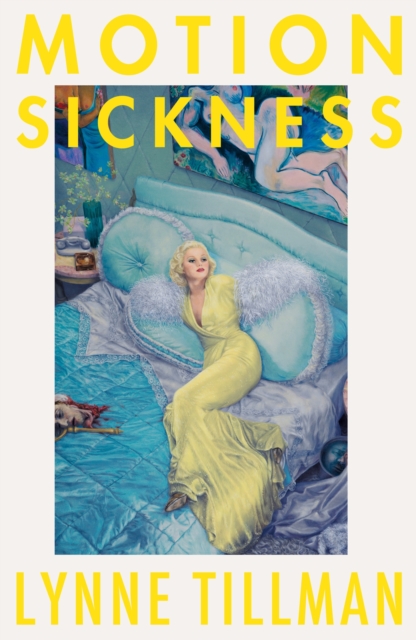An Interview with Will Rees from Peninsula Press (SMOL Exclusive)
Guest
Hello, SMOL subscribers! Especially for your reading pleasure this month, Will Rees from Peninsula Press talked to us about Motion Sickness by Lynne Tillman, this month's featured SMOL book. We hope you enjoy...
Will! Thanks for answering some questions for us. Can you tell us a bit about how Peninsula Press came to be?
Well firstly, thank you – it’s a real pleasure to be featured by Lighthouse, one of our favourite bookshops in a city full of brilliant bookshops. The three of us – that’s Jake, Sam, and Will – started Peninsula at the end of 2017. We were all booksellers who had briefly flirted with careers in mainstream publishing, though I don't think any of us had much appetite for what that would entail in practice. Working in a bookshop meant we knew a lot of writers and independent publishers. That demystified the process and made it seem like it might be possible. We crowdfunded a little money to get going – about £9k – and then published our first books in 2018. At first publishing each book felt like a roll of the dice: if it sold, we could do another one. If not… That was five years ago, and things have grown from there.
Our featured book Motion Sickness was originally published in 1991. What makes it so relevant and readable today?
In Motion Sickness Lynne is playing with traditions that have typically been associated with male writers and their protagonists: the picaresque novel of early-modern Europe and the road novel of the Beat Generation. Arguably she is thinking of Debord, too, and his dérives. Here we have a young female protagonist, a pícara, drifting around Europe, doing so without the frictionlessness of her male counterparts yet with guile, good humour, an eye for the absurd, a taste for adventure, a commitment to pleasure. One thing we’ve been told constantly since publishing Lynne is that it’s as if the world has caught up with her. There’s a lot in that, I think. Lynne has never written victims, and she has always refused the temptation to write role models: her characters are intelligent, intrepid, defiant, flawed, contradictory. Realistic, in a word – though Lynne’s novels eschew the reductions and restrictions of the hegemonic literary realism that has sought to monopolise that word. Lynne’s characters – and Motion Sickness is no different – are formed within a political-cultural milieu, but they’re not defined by it. The early novels remain so readable because the sentences are extraordinary; they remain relevant because in them Lynne proves herself to be one of the most nuanced and perceptive chroniclers of life under patriarchy.
This is the fifth book by Lynne Tillman that Peninsula has released so far. What’s it like publishing such a revered and iconic American writer for a UK readership?
One of the biggest pleasures of publishing so far has been helping UK-based readers discover (and in some cases, rediscover) the work of Lynne Tillman. Lynne was hardly unknown here: her criticism has been consistently published in places like Frieze for many years, and she’s long been a name in contemporary art circles. But despite the noble efforts of Serpent’s Tail under Pete Ayrton in the late 80s and 90s, her fiction was scandalously underread. Which was a shame because she is, simply put, one of the English language’s most exciting, tirelessly innovating writers of the last forty years. One thing I love about Lynne is that no two of her books are the same: she is someone who has never come to sound like herself.
We really like the Peninsula Press covers for Lynne's books. Can you tell us a bit about the design process?
With the exception of Men and Apparitions and Mothercare, we have used paintings by the brilliant US-based artist Hilary Harkness. Weird Fucks was designed by Harry Hepburn. Since then we’ve worked with other designers while keeping the format the same. The idea has always been that they’ll look good alone, but even better as a set.
What other books are coming up from Peninsula Press that our subscribers can look forward to reading soon?
So many! But I’ll just name a few. Lovebug by Daisy Lafarge, a gorgeously written, expansive essay about intimacy, infection, and the entanglement of human and microbial life. Centroeuropa by Vicente Luis Mora, an atmospheric novel that introduces the English-speaking world to one of Spain’s foremost experimentalists, with touches of W. G. Sebald and Virginia Woolf’s Orlando. And in January, The Long-Winded Lady by Maeve Brennan, a collection of micro-essays which capture the shimmering and effervescent spectacle of metropolitan life. Brennan was one of the twentieth century’s greatest (if most overlooked) prose stylists; our edition will be introduced by another brilliant writer, Sinéad Gleeson.
Last one – what are some of the things you like best about running an independent publisher? (We know it’s not easy, but we love and appreciate what you do!)
Our name, Peninsula, suggests an idea independence while also referring to the wider world to which we, like every publisher, remain attached. The best thing about being an independent publisher is the freedom from constraint which allows us to contribute what we deem to be the very best works of literature to the cultural landscape.
~
We hope you enjoyed reading the inside scoop from one of the UK's most exciting indie presses right now. To find out more about Peninsula Press, head to their website here.

Linked Books

- title
- Motion Sickness
- author
- Tillman, Lynne